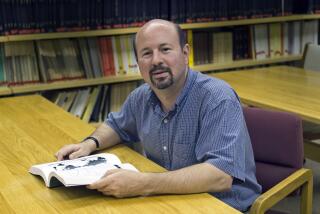Disputes Hinder Action on World Warming Trend
WASHINGTON — The White House, buffeted by criticism for its apparent reluctance to combat the threat of global warming, acknowledged Monday that it has been hindered by disputes within the Administration about how best to address the sensitive issue.
The admission came as evidence of the indecision emerged in Washington and Geneva, where U.S. officials acting under White House orders backed away Monday from plans to identify global warming as an environmental threat of major importance.
In Geneva, the wariness led to the withdrawal of a planned U.S. initiative urging the United Nations to convene an international convention identifying global warming as a world threat. U.S. delegates attending a conference there were left with no formal Administration “response strategy” to endorse.
Change in Testimony
Meanwhile, in Washington, the Office of Management and Budget ordered a high-ranking government scientist to tone down testimony citing his belief that global warming could have a grave environmental impact on the planet within a lifetime, the scientist told members of a Senate subcommittee.
Angry senators accused the White House of suppressing science for political ends, charging that the Administration was not willing to advocate the changes necessary to halt the accumulation of atmospheric gases believed likely to cause a sharp increase in surface temperatures in coming decades.
“The Administration does not want to act,” said Sen. Albert Gore Jr. (D-Tenn.), chairman of the Senate Commerce Committee’s panel on science, technology and space. “They want to sit still and do nothing.”
But the White House defended its go-slow policy on grounds that it remains divided on how to interpret evidence about the warming phenomenon, whose severity remains a matter of dispute.
“Unless we base decisions on sound scientific data,” White House spokesman Marlin Fitzwater said, “we could end up being forced to agree with reductions in global warming gases that are neither realistic nor economically sound.”
Predictions of global warming are based primarily on recorded increases in the atmosphere of carbon dioxide and other gases, which can produce a “greenhouse effect” that causes the Earth’s atmosphere to retain heat.
The buildup is believed to have been caused primarily by human activity, including the burning of coal and other fossil fuels and the destruction of forests. For that reason, those seeking to mitigate the effects have urged that nations begin promoting more efficient energy policies and reforestation.
Some Officials Want Treaty
Advocates of the proposed U.S. initiative for an international convention on global warming--including Environmental Protection Agency Administrator William K. Reilly and senior State Department officials--saw the Geneva meeting as a step toward an eventual treaty to reduce production of greenhouse gases.
Such an agreement would emulate the Montreal Protocol, the historic agreement under which dozens of nations have pledged to reduce production of the chlorofluorocarbons that threaten the Earth’s protective layer of stratospheric ozone.
The plan was to have been presented Monday by U.S. delegates to a meeting convened by the United Nations Environmental Programme. But the initiative was blocked by White House and OMB officials who raised concerns about moving too quickly on a plan whose eventual economic costs had not yet been calculated, Administration officials said.
“There is disagreement within the EPA, within the State Department and within the Administration,” Fitzwater said Monday.
“The Geneva meeting was not called to discuss a convention,” he said. “It was called to review the scientific evidence to date. Our position is that we are not yet ready for a convention . . . . “
Democratic senators attending the hearing on global warming expressed exasperation with the Administration’s move, likening its indecision to the case of a man who refuses to buy life insurance until it is too late.
“Where have they been? What have they been doing?” Sen. Timothy E. Wirth (D-Colo.) asked. “The time has come to put this issue more highly in the lights.”
Toward that end, Gore and Wirth sought to exploit complaints by noted National Aeronautic and Space Administration scientist James Hansen that anonymous OMB officials had directed him to “soften” the testimony about global warming that he had prepared for the subcommittee.
Hansen’s original testimony indicated that he accepted scientific predictions of the severe environmental consequences of global warming and blamed human activity for the accumulation of greenhouse gases.
Doubts Raised on Accuracy
The OMB-ordered changes raised strong doubts about the accuracy of scientific models predicting the effects of global warming and stated that the extent of human responsibility is “scientifically unknown.”
The OMB routinely reviews written prepared testimony by government officials to ensure that it is consistent with Administration policy, and mandatory changes are not unusual. But Hansen complained that his testimony was to be presented as his own “scientific conclusions” and not as Administration policy.
Gore went further, accusing the Administration of committing “scientific fraud” and comparing the OMB-ordered alteration of scientific conclusions to a governmental practice once common in the Soviet Union.
“How are we, as policy makers, to develop effective responses if this Administration is routinely going to censor the evidence that scientists bring to Congress?” Gore asked.
Fitzwater praised Hansen, calling him an “outstanding and distinguished scientist.” The changes in Hansen’s testimony, Fitzwater said, were made only to make clear that not all scientists agree with the conclusions he had reached and that the Administration had not yet decided which view it accepts.
The Bush Administration’s slow progress toward a policy on global warming comes in marked contrast to the emphasis President Bush gave to the issue during last year’s presidential campaign. In an October, 1988, speech at the Scripps Institution of Oceanography in La Jolla, Calif., for example, Bush pledged that during his first year as President he would “convene a global conference on the environment, at the White House, to address global warming.”
More to Read
Sign up for Essential California
The most important California stories and recommendations in your inbox every morning.
You may occasionally receive promotional content from the Los Angeles Times.











